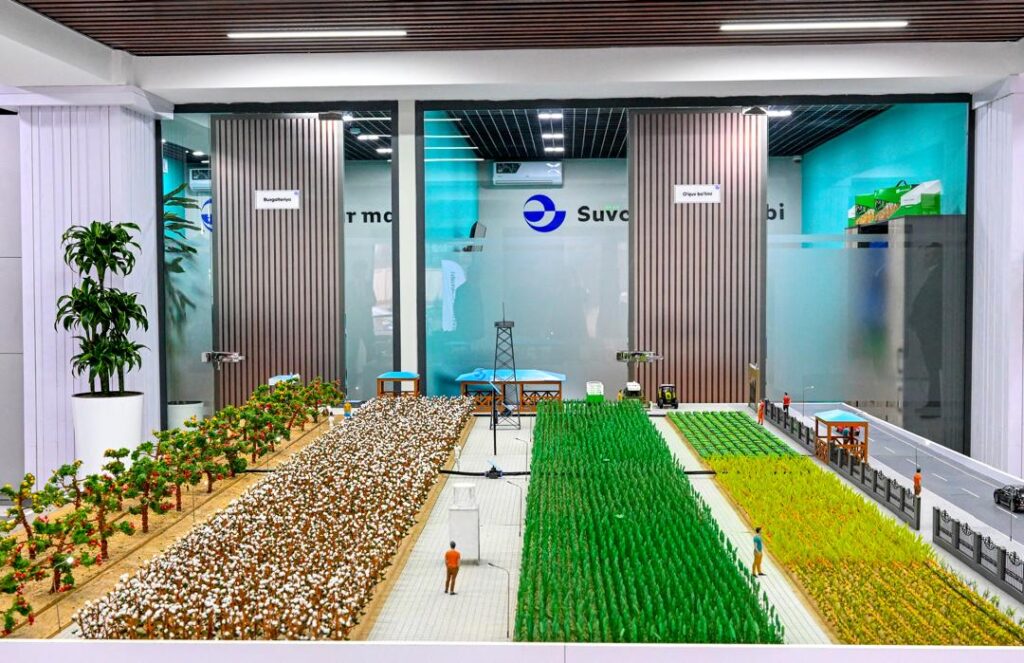
How Uzbekistan is fostering a culture of water conservation?
By 2030, “Suvchilar Maktabi” aims to train over 60,000 specialists in the agricultural sector.
In the context of climate change and water scarcity in Uzbekistan, a unique project called “Suvchilar Maktabi” is gaining momentum. Its goal is to teach farmers how to use water efficiently, implement modern water-saving technologies, and increase crop yields.

How it all began?
The idea came about after a video conference held by the president on April 18, 2023. Soon after, on May 29, with the support of Agrobank, the first stage of “Suvchilar Maktabi” was launched.
The main task is to change the established perception that “water is free” and to form a culture of rational water use in agriculture. To this end, both local and foreign experts are involved, and the experience of Türkiye, China, and Spain is being studied.
First stage: tens of thousands of farmers in the regions.
From May to October 2023, more than 61,500 students in 155 districts underwent training.
Fifty teachers and experts, including specialists from Turkey and Spain, were involved in the project.

Stage two: in-depth program and field practice
In February 2024, “Suvchilar Maktabi” reached a new level. Training classes and experimental fields covering 15-20 hectares were opened in 13 regions, equipped with modern drip and sprinkler irrigation systems.
Over the course of a year, nearly 13,000 farmers have been trained, and about 4,000 farms have implemented water-saving technologies.
A total of 234 teachers and experts have joined the project, including specialists from Turkey, China, and Spain.
The following results of the experiments:
- water consumption was reduced by 44%;
- labor costs were reduced by 50%;
- expenses were reduced by 21%;
- crop yields increased by 31%.
Farmers’ voices
Samad Shokirov, a farmer from Samarkand, shared his experience:
I have been growing cotton and grain for 25 years. I have always used traditional irrigation methods, but today there is a shortage of water all over the world. That is why we decided to gradually switch to water-saving technologies. At “Suvchilar Maktabi”, we are taught how to use drip and sprinkler irrigation and how to use underground hoses. In addition, they tell us about subsidies and benefits that the state provides to farmers. This is very convenient and useful.

International cooperation
Since 2024, specialists from neighbouring countries have been participating in “Suvchilar Maktabi”.
Foreign students learned about the Uzbek water management system and the practice of introducing modern technologies.

Expert opinion
According to Turkish specialist Mehmet Akif Keskin, the approach to technology implementation must be individualized:
Each region requires different solutions. We study 10 years of climate data, analyse soil and water, and only then design an irrigation system. Even within Uzbekistan, there are significant differences between regions. That is why it is so important to adapt technologies to specific conditions.

New directions: cotton and demonstration fields
Special attention is paid to the cultivation of foreign cotton varieties that are better adapted to the changing climate and produce higher yields. The course was developed in collaboration with the Cotton Research Institute, with the participation of experts from China.
In 2025–2026, it is planned to organize 7,000 hectares of “smart” experimental fields in 155 districts. Each 30-hectare plot will be equipped with solar panels, water metering systems, and seasonal field shelters.

Long-term goals
By 2030, “Suvchilar Maktabi” intends to train over 60,000 specialists in the agricultural sector.
The project has already proven its effectiveness: thousands of farmers are implementing water-saving technologies, and crop yields are increasing. But most importantly, a new culture is emerging: an understanding that water is a precious resource and that every litre counts.
– Utkir Alimov,
Journalist













